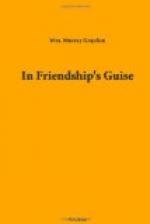“I don’t think there can be much doubt about that,” replied Nevill, whose quick mind had grasped the situation in all its bearings; he realized that there was no alternative—save ruin—but to submit to the scoundrel’s terms. But the bargain must be made as easy as possible.
“I must know more than you have told me,” he went on. “How did the letter come into your possession? And why have you waited more than five years to make use of it?”
Mr. Timmins was not averse to answering the questions. He pulled his chair closer, and in low tones spoke for some minutes, revealing all that Nevill wished to know, and much besides that was of interest.
“You’ll find me a square-dealing customer,” he concluded, “and I expect the same of a gent like you.”
Nevill shrank from him with ill-concealed disgust and repulsion; contact with the lower depths of crime affected his aristocratic sensibilities.
“You swear that you have all the papers?” he asked.
“Yes.”
“And they are in a safe place?”
“If I was to drop over dead, sir, they wouldn’t be found in a hundred years.”
“We’ll proceed to the next question,” Nevill said, abruptly. “To speak with brutal frankness, Mr. Timmins, what is your price?”
“One thousand pounds in cash, when the papers are handed over,” was the prompt reply, “and a signed agreement to pay me as much more when you come into—”
“Do you take me for a millionaire?” cried Nevill. “It’s all right about the agreement, but a thousand pounds is utterly beyond my means. Say two hundred.”
Mr. Timmins shook his head, and glanced significantly about the room.
“I can’t take a shilling less,” he firmly replied. “I know a good thing when I have it, sir.”
Nevill temporized. He argued and entreated, but without avail. He had an inflexible customer to deal with, who would not be put off with anything but his pound of flesh. A decision that night was impossible, and arrangements were made for another meeting within a few days. Then Mr. Timmins filled his pocket with cigars and took his leave.
Nevill let him out into Jermyn street, locked the door, and returned to his sitting-room. His face was distorted with evil passions, and he spilled the brandy on the table as he poured some into a glass.
“Curse him!” he said, hoarsely. “He again! Is he destined to blast my life and ruin my prospects?”
* * * * *
The “do” at Joubert Mansions, Chelsea, by no means fell short of Jack’s forecast; on the contrary, it exceeded it. His memory failed him as to what transpired after three in the morning; he woke at noon in a strange bed, with a sense of overmastering languor, and a head that felt too big for his body. Vance Dickens, with a palette on his thumb, was standing over him. He laughed till the roof threatened to come off.




